
WifeLess
-
Posts
273 -
Joined
-
Last visited
Content Type
Profiles
Forums
Articles
Calendar
Blogs
Posts posted by WifeLess
-
-
ATJ,
When I read your introductory post yesterday, though the username was different, I nevertheless knew that SF had returned. No other writes as you do.
It is so good to see you here. Far too many years have passed since you shared your thoughtful, eloquent and beautiful posts with us. As I mentioned long ago on YWBB, your contributions there were greatly responsible for my joining that site, which ultimately led to tremendous healing, a multitude of wonderful wid friends, a rediscovery of true love, and a return of incredible happiness. For these, I will always be grateful to both YWBB and you.
Welcome back.
--- WifeLess
-
keeptrying,
Welcome to Young Widow Forum.
It is certainly understandable that you are feeling the incredible pain you describe in your post. The psychological trauma of the SOS (survivor of suicide) of a loved one is classified among the most extreme that a person may ever experience. And this is made even worse when that suicide is of one's spouse, whose death is ranked as the single most emotionally stressful event in an adult's life.
With regard to the guilt, stigma, shame and endless self questioning associated with being an SOS, as I say in my introductory post in this section:
" ... if I learned anything during the past several decades with my wife, it is that clinical depression is a serious illness just as real as any other life-threatening illness, like heart disease or cancer. Unfortunately, it happens to be classified as mental illness, which makes it appear different. My wife died of a disease of the brain that impaired her thinking and her judgement. I take some comfort in accepting that she died, not by choice, but of natural causes."
Sorry for the tragic loss that brought you here.
--- WifeLess
-
Thank you singinmomo4 for creating this testimonial thread, just as you did a similar one on our old site. Your story indicates why you are sometimes called the Bago Diva. The following is an update of what I once posted on that previous thread.
During the past 5 years I have attended dozens of widowbagos and arranged more than 15 brunch widowbagos myself. In the NY/NJ/PA area, we frequently get about 20 wids in attendance (often including the Bago Diva herself). In the past I frequently posted about the benefits of attending widowbagos, often recommending them to newer members, especially those who feel alone and isolated from others. Below are a few excerpts from these posts:
I was just telling some (non-widowed) friends about our widowbagos . . . I told them about:How genuinely happy everyone is to see each other.
How comfortable everyone is in each other's company.
How easy it is for us to talk with each other about nearly anything, no matter how personal, emotional, painful.
How we sometimes talk so lively or laugh so loud that I'll bet no one observing us could possibly guess the tragic circumstances that brought us all together.
How, in the midst of it all, we might shed a few tears but no one asks why since everyone already knows.
How long these dinners last since no one wants to leave.
How all of you seem like old friends to me even though the first time I met any of you was only a few months ago, and we've gotten together only a few times, but it seems much longer than that, like we've known each other for years.
How we can't wait for the next one.
I too was shy about going to my first one . . . It was in NYC. I had to force myself. But after meeting everyone, I was immediately comfortable. And I was never again reluctant to attend. It is always a great experience . . .At first, I was completely alone . . . I knew no other widow(er)s besides seniors. It was only when I started attending widowbagos that I began to meet others like me. Some members of this site are now my closest friends. Unlike everyone else, WE ALL GET IT.. . . the friends I've made at widowbagos around here in the NYC/NJ area. We truly lift each other's spirits when we are together, and no one is made to feel like the odd, sad one.. . . those I have met at widowbagos, most of whom I now consider friends, have been the greatest source of support and encouragement. We always seem to have a great time together, often talking and laughing louder than most others around us, although there may be a few tears as well. But then to also see how they have continued on with their lives despite the challenges they now face is indeed inspiring.About 3 months after my wife's death I attended my first widowbago, which proved to be a truly life-changing experience. It was the first time since her death that I felt a sense of excitement and enjoyment of something. I suddenly felt like I belonged somewhere. Not long after that, almost everyone I associated with outside of work was a widow(er), some of whom eventually became my best friends.
Even now after 3 years, we still get together sometimes, both at widowbagos and privately too. We also call or email regularly. And these fellow travelers on this difficult journey have provided me with, not only friendship and entertainment, but also understanding and support. As I once said to them in a post: "It keeps me sane to talk with all of you. Well, what passes for sanity these days."
Without question, the single greatest factor in my emotional survival and recovery in the aftermath of my wife's death was this new set of YWBB friendships I formed. So if it is a possibility, I strongly recommend your looking into widow(er) groups, either associated with YWBB or otherwise.
Perhaps some pictures will be more convincing. The following photos were taken at one of our Sunday brunch widowbagos in NJ, at several Saturday evening dinner widowbagos in southestern PA, and at a Sunday afternoon widowbago in MD:
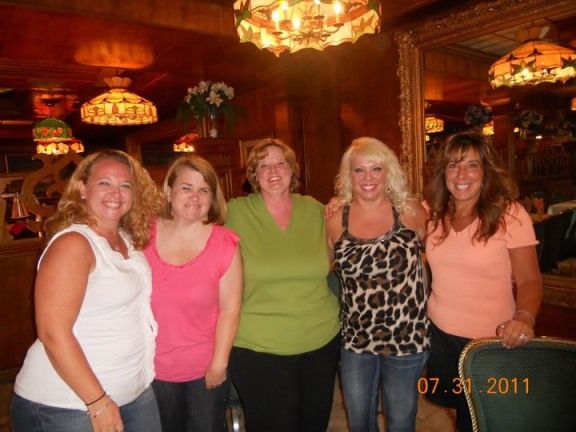
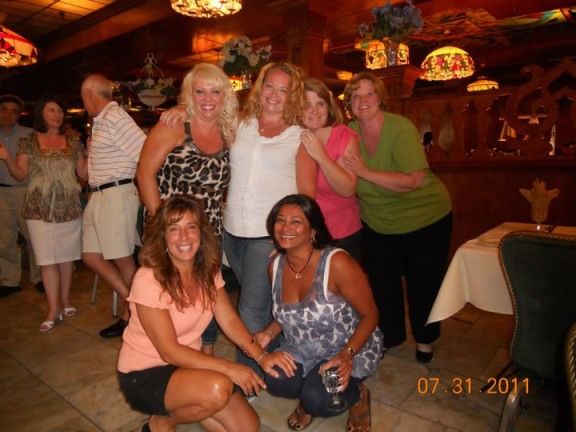
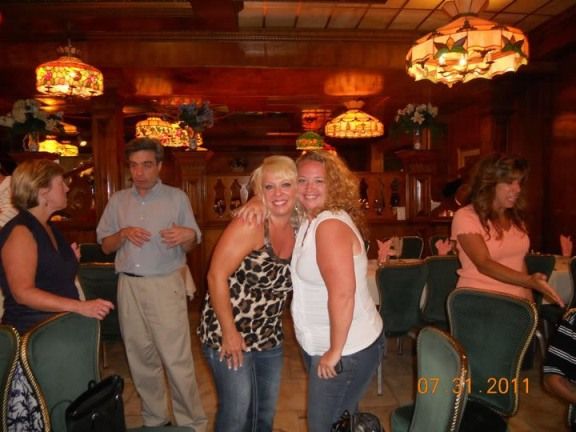
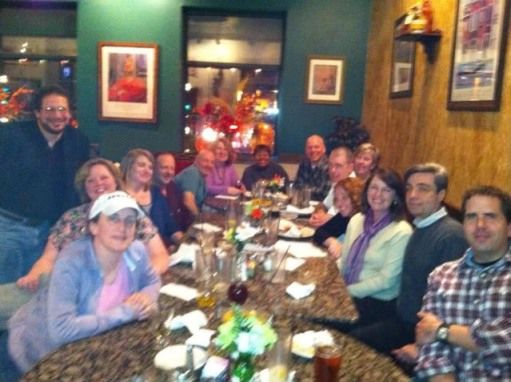
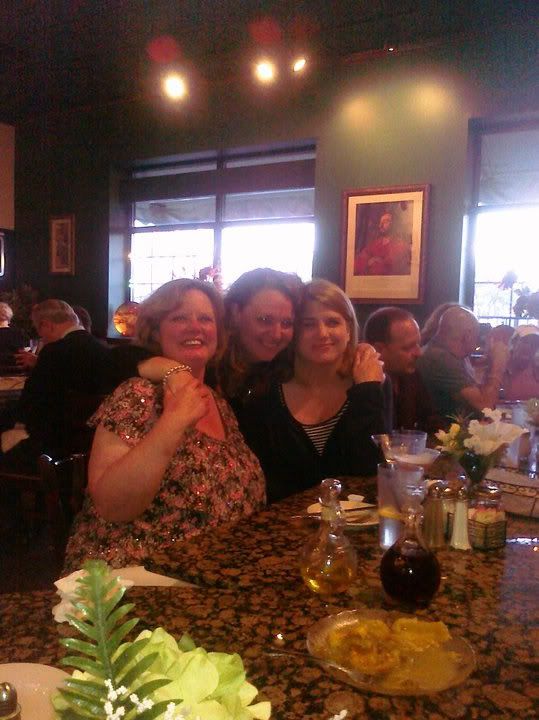
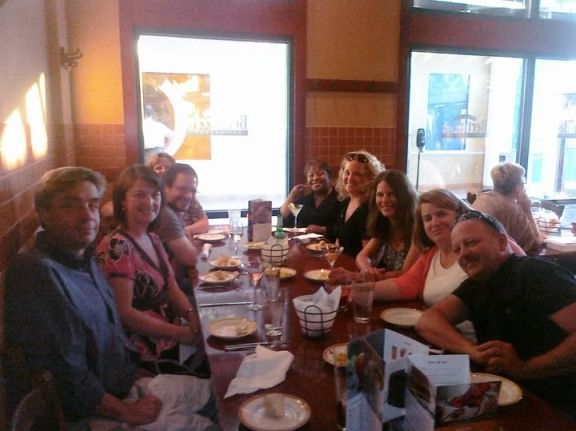
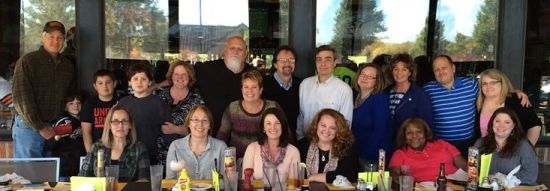
And several years ago, my lovely Bluebird used her cell phone to make this short video of what it is like to attend one of our NJ brunch widowbagos:
But of course my favorite was the "Weddibago" at which Bluebird and I were married. Everyone in this photo (except the baby) is a widow(er):
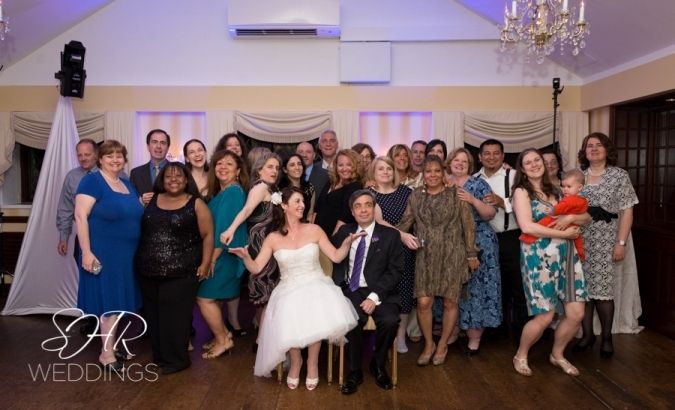
So, to those who have not already attended a widowbago but may be considering it, I say as I once posted:
During my entire first year, the greatest joy I felt was when I was with my new widowed friends. If you have not already done so, I strongly recommend your looking into widowbagos in your area. Smiles and laughter are always in abundance there.--- WifeLess
-
hachi,
Thank you for posting this. Very inspirational. After some online investigation, it appears that this is a slightly edited version of "The Awakening" by Sonny Carroll.
--- WifeLess
-
And Linda L's "Suicide is Not a Choice" thread too.
-
Several months later another member posted on Naurek's thread that he had just visited a shopping mall and felt quite out of place there with neither a spouse nor a child. In response, I posted this about feeling invisible at such places:
My beloved wife and I were together for more than 25 years, nearly half my life, and we never had children. About a month into my new existence, I went to the shopping mall for the first time since her death. The place was of course filled with the usual shoppers of all types: teenagers and young adults with their friends, talking and laughing loudly, each brimming with energy and exuberance for life; young lovers holding hands, or one with an arm around the other, frequently stopping to look for some small memento that might express their love for each other; senior couples, likely husbands and wives for decades, walking slowly now, not really shopping but just there for the exercise; and of course parents with their young children, some in strollers, others wandering off to peer through the window of some toy or pet store.
And then there was I. Although none of those others were able to see me. For I had recently become invisible. Or so it felt. The only one who really saw me, the one who in seeing me through eyes of love instilled within me enough substance to be seen by others as well, was not there. She was no longer anywhere. She had gone, taking with her my only connection to all that life going on at the mall as well as in the rest of the world. Making me quite invisible.
I don't go to shopping malls very often, even now. Nor to many other large public places. As many of us here have discovered, it is not easy to wander around as a ghost. Unseen, unnoticed, unknown. Invisible to all others. Without substance. Without love.
--- WifeLess
-
kmouse,
Thank you for restarting this thread here on Young Widow Forum. During the 5+ years that have passed since my wife's death, life has changed greatly for me. But early on, I posted several times on Naurek's "Island of Misfit Widow(er)s" thread. The first time was with this when I was 5 months widowed:
Naurek,
I know how you feel. My beloved wife and I were together for more than 25 years, almost half my lifetime. And by choice, we never had children. Unlike being in your teens, 20's and perhaps early 30's, hanging out with friends is no longer the usual lifestyle as you enter those middle-aged years, late 30's, 40's, etc. Especially as the majority of your peers begin to have children, and so their priorities, interests and lifestyle become dramatically different from yours.
From the stories I have been reading on this site and elsewhere by other childless and/or childfree couples, it seems to be a fairly universal theme, the concept of quietly "nesting" together, for lack of a better word. When not working, then spending time with only your spouse/partner by your side, doing pretty much nothing together. Although much more free to enjoy an evening out, go on vacation, etc., still most of the time you prefer just staying at home, relaxing, being lazy and comfortable alone together.
But suddenly comes widowhood, at least for we unfortunate ones here. The life you have been living, perhaps for decades like me, vanishes in a moment. After the shock dies down and once you finally begin to get a handle on the grief and keep it in check, then what? Others may encourage you to get back into life, but what does that mean when the only life you knew for so many years no longer exists?
So you go out there, if you are strong enough, and take a look. It is so alien from the world you once knew. All you see are young couples still partying, or couples with young children, and since I am older than most here, couples with grandchildren now as well. What happened to my peers? I don't seem to have any.
Even before her death, I along with my wife often felt like "outcasts", simply because we had no children. But we didn't mind being on that "island of misfits", since we had each other and that was enough. But I know not how I will fare alone on the "island of misfit widow(er)s".
--- WifeLess
-
Andyswife,
Thank you for your post. I'm glad to see that you found your way here. I hope things are going well for you.
--- WifeLess
-
lcoxwell, thank you for starting this thread.
As a result of our regular posting on the old YWBB and attending local widowbagos, Bluebird and I met for the first time in 2010. And quite unexpectedly, we immediately fell in love. Three years later we were married in the presence of family and friends, including several dozen fellow members of that board. Here is our formal wedding photo.
--- WifeLess
-
Trish,
Thank you for reposting this. On the previous board, this post began a classic thread that hundreds of others contributed to over the course of the next 10 years. And I would often refer new SOS (survivor of suicide) members to it when they joined. I'm sure this will be the case here as well.
--- WifeLess
-
 1
1
-
-
To any new survivor of suicide (SOS) member: Welcome to Young Widow Forum.
The psychological trauma of the SOS of a loved one is classified among the most extreme that a person may ever experience. And this is made even worse when that suicide is of one's spouse, whose death is ranked as the single most emotionally stressful event in an adult's life.
There are a number of us here who bear the extraordinary burden of the SOS widow(er), and I am among them. After 28 years together, I lost my wife to suicide in 2009. She had been diagnosed with bipolar disorder, and during the decades we were together experienced several major depressive episodes, the last of which she did not survive. Not only she, but her family too had an extensive history of mental illness and suicide stretching back several generations. At least 5 of her family members completed suicide, including her younger brother, a few aunts and uncles, and a grandparent. And a number of others needed medication for depression and/or psychiatric hospitalization, including 2 of her siblings, her mother and several aunts. It became clear long ago that the predisposition to mental illness they all suffered from was biochemically based and genetically inherited.
I have accepted that my wife's suicide was not about me or even her life circumstances. It was about illness. If medical science has learned anything in recent decades, it is that so many psychological/behavioral problems stem from physiological/biochemical abnormalities of the brain, many of which are genetically inherited. And if I learned anything during the past several decades with my wife, it is that clinical depression is a serious illness just as real as any other life-threatening illness, like heart disease or cancer. Unfortunately, it happens to be classified as mental illness, which makes it appear different. My wife died of a disease of the brain that impaired her thinking and her judgement. I take some comfort in accepting that she died, not by choice, but of natural causes.
So that is a short summary of my story. If you are an SOS widow(er) pease feel free to share yours on this Board as well. Sorry for the traumatic loss that brought you here.
--- WifeLess
-
The following was written by LaRita Archibald, founder of a network of support groups for survivors of suicide (SOS). Although the content may at first appear to be religious in nature, it is really not. I think it may speak to many of us who are SOS regardless of our spiritual beliefs. Parts may also resonate with some others here who are not SOS but whose loss is nevertheless associated with shame, stigma, or complicated grief.
Beatitudes For Survivors After Suicide (by LaRita Archibald)
BLESSED are they that recognize suicide grief is compounded; that we grieve the death of a beloved person, but first and foremost, we grieve the cause of the death.
BLESSED are they that give us permission to mourn the loss of one dearly loved, free of judgment, censure, and shame.
BLESSED are spiritual guides who relieve our concerns for the repose of our loved one's soul with the truth that God is All-Knowing, All-Loving, and All-Forgiving.
BLESSED are they that don't offer the meaningless cliche, 'Time Heals', because, for a long while, the passing of time holds no meaning or value for us.
BLESSED are they that don't say, 'I know just how you feel' but instead say, 'I am here for you. I will not tire of your tears or your words of sorrow and regret.'
BLESSED are they that have the patience and love to listen to our repetitive obsession with WHY? without offering useless answers or explanations.
BLESSED are they that reaffirm the worth of our deceased beloved by sharing memories of his/her goodness and times of fun, laughter, and happiness.
BLESSED are the mental health care providers who explain to us that, very probably, our loved one died of a terminal illness called depression.
BLESSED are they that challenge our sense of omnipotence with the reminder that no one has enough power or control over another to cause them to end their life.
BLESSED are the first responders to our loved one's suicide who try to relieve our sense of guilt and responsibility by assuring us, 'This death is not your fault.'
BLESSED are they that lend acceptance to the value of the relationship we shared with the one who died by allowing us to speak of them and 'what might have been'.
BLESSED are they that allow and encourage us to use our loved one's death in a manner that gives our loss and grief meaning and purpose.
BLESSED are they that do not expect us to find 'closure', 'grief resolution', 'recovery', or to 'be healed', understanding that these terms define 'grief work in progress' that will take the rest of our life.
BLESSED are community caregivers who direct us to suicide bereavement support groups where our anguish is understood, our loss validated, and where we are encouraged by the example of others who have traveled this road before us.
BLESSED are 'seasoned' suicide survivors who role model not only that we can survive, but, in time, we can thrive, we can regain peace of mind, restored confidence, renewed productivity, and a revived zest for living.
BLESSED are all who honor our loved ones by remembering how they lived rather than how they died.
-
YWBB is an incredibly important resource for me, but I also found some other sources of assistance such as the AFSP to be very helpful for finding more local resources. What have you found helpful? Let's fill this thread with resources for those in similar circumstances.
In the UK, we have a charity called Survivors of Bereavement by Suicide which runs monthly support groups in several locations. I go to the London one sometimes. It's for anyone who has lost a loved one to suicide but there a good few spouses.
Below are some additional links with resources that may be useful to you:
American Foundation for Suicide Prevention
American Association of Suicidology
Survivors of Suicide
Survivors of Suicide Loss (mostly California but with other resources listed)
Alliance of Hope
Suicide Prevention, Awareness, and Support
Suicide Prevention Resources for Survivors of Suicide Loss
If there are any fellow Finns, here are ours:
www.nuoretlesket.fi/yhteystiedot/
sphoc,
Below are links to some info that might be helpful to new SOS (survivor of suicide) members.
From the AFSP (American Foundation for Suicide Prevention):
http://afsp.org/find-support/ive-lost-someone/
And from the AAS (American Association of Suicidology):
www.suicidology.org/Portals/14/docs/Survivors/Loss%20Survivors/SOS_handbook.pdf
--- WifeLess
One of the best books I read was Griving a Suicide by Albert Hsu. The book is written from a Christian perspective (and quotes Scripture), so it might not be helpful if that isn't your background, but it helped me greatly with reconciling DH's death and my faith.
-
Below is a slightly edited version of "Bill of Rights for Grief" by Pamela Cytrynbaum:
www.psychologytoday.com/blog/because-im-the-mom/201305/private-pain-mourners-bill-rights
Perhaps it will prove helpful to some new widows and widowers reading this, especially those who feel they are receiving an excess of unsolicited advice.
Bill of Rights for Grief
1. You have the right to take whatever path you take through your grief without judgment.
2. You have the right to ignore or incorporate any or all of the MOUNTAINS of advice you will get.
3. You have the right to say: "No thank you."
4. You have the right to grieve for whatever you have lost, including things you never had but ache for, like phantom limb pain.
5. You have the right to ask people to bring you pizza, not platitudes.
6. You have the right to your own definition of grief. For someone else the loss may have some unknowable reason; it may be a journey, a blessing 'in disguise', bad karma, a teachable moment, part of a plan, a test, a process, a choice. It doesn't have to be any of those things for you. It can simply be where you are at the time. Or it can be senseless, stupid, meaningless and profoundly awful.
7. You have the right not to be grateful, reasonable, inspired or inspiring.
8. You have the right not to feel or believe or be comforted by any of the following: "he's in a better place; his work here was done; she's in your heart; it's a blessing; it's no one's fault; time heals all wounds; you'll find a new one; it could have been worse."
9. You have the right to buzz around, filling your life with activities and people so you don't have to feel a thing.
10. You have the right to feel what you can feel when you can feel it. Be numb when you are numb. Seek comfort when you can stand to. Sometimes the deep fog of grief can make all intimacy too painful - any feelings unbearable. You have the right not to bear them even when everyone around you says you MUST FEEL YOUR FEELINGS OR YOU WILL NEVER MOVE ON.
11. You have the right not to "move on."
12. You have the right to ungodly, ugly, blind rage.
13. You have the right to feel complete, utter hopelessness and despair, and to say - out loud - over and over, that it will never get better, you will never feel better - without everyone shushing you.
14. You have the right to eat or sing or say whatever you want.
15. You have the right to be inalterably changed. The person you were before the death of your loved one is gone. You are now someone else. You don't know who yet. It's your right to find out.
16. You have the right to experience the many tricky, shape-shifting forms grief takes in whatever order you experience them: Here it looks like rage. There it takes the shape of obsession. It has many forms. They are all true. They are all lies.
17. You have the right to stay where you are. Sometimes there are no signs at all and you are moving through grief's darkest depths without knowing it. It's like starting on the bottom floor of an elevator in the deepest core of the earth. Each floor you go up, the doors open, only to reveal more darkness. It all looks and feels the same, but it is not. You are moving toward where you need to be.
18. You have the right to self-pity, selfishness, self-loathing, self-awareness. You have the right to be YOURSELF. Deep grief is a profoundly lonely experience, and yet, it binds us all. We all walk beside you, which will give you comfort when you are ready.
-
Thank you for reposting "Letter to a Friend", which I think offers the best description I have read of the early weeks and months of widowhood. For years, it resonated with many widows and widowers on YWBB, and I suspect this will be the case here as well.
--- WifeLess
-
Thank you for reposting my "Unique and Devastating Loss" essay. I hope it will be of help to any new widow or widower who finds their way here.
--- WifeLess

Surviving the suicide of a spouse
in Suicide/Addiction/Mental Illness/Abuse
Posted
mixelated,
Welcome to Young Widow Forum.
An excerpt of one of my posts on our previous board:
"The stigma associated with mental illness continues to astound and outrage me. If one were to suffer from some other potentially fatal illness, such as cancer, the reaction would most certainly be quite different. It is clear that being afflicted with that type of serious long-term illness is an unusually heavy burden. But when it comes to chronic mental illness, such as major clinical depression, bipolar disorder, addiction, etc., not only is such sympathy frequently lacking, but many believe that some sort of cosmic punishment is actually called for on top of this. Why the difference? Why do so many people feel that we are blameless when it comes to most physical illnesses, while suffering from a life-threatening psychiatric illness must be our own fault?"
Sorry for your tragic loss.
--- WifeLess